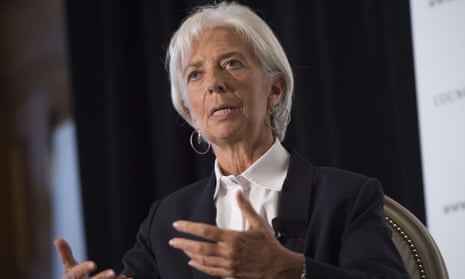A marked slowdown in big emerging market countries will cut global growth to its lowest level since the deep recession of 2009, the head of the International Monetary Fund has warned.
Christine Lagarde, the IMF’s managing director, said forecasts to be published by her organisation next week would show activity expanded by less than the 3.4% recorded in 2014 – the joint weakest since the world economy came to a standstill six years ago.
Speaking in Washington, Lagarde said “global growth will likely be weaker this year than last, with only a modest acceleration expected in 2016”.
Lagarde said she was “concerned about the state of global affairs”, highlighting the refugee crisis in Europe, the prospect of 2015 being the hottest year on record and the state of the global economy.
“The prospect of rising interest rates in the United States and China’s slowdown are contributing to uncertainty and higher market volatility. There has been a sharp deceleration in the growth of global trade,” she said. “And the rapid drop in commodity prices is posing problems for resource-based economies.”
The good news had been the modest pick-up seen in developed countries, Lagarde said, but this was offset by the fifth year of declining growth rates in the emerging world.
“India remains a bright spot. China is slowing down as it rebalances away from export-led growth. Countries such as Russia and Brazil are facing serious economic difficulties. Growth in Latin American countries, in general, continues to slow sharply.”
Lagarde said financial stability had not yet been assured despite progress in recent years to make the system safer. “If we put all this together, we see global growth that is disappointing and uneven,” she said. “In addition, medium-term growth prospects have become weaker. The ‘new mediocre’ of which I warned exactly a year ago – the risk of low growth for a long time – looms closer.
“Why? Because potential growth is being held back by low productivity, population aging, and the legacies of the global financial crisis. High debt, low investment, and weak banks continue to burden some advanced economies, especially in Europe; and many emerging economies continue to face adjustments after their post-crisis credit and investment boom.”
Lagarde warned that the slowdown in China would have knock-on effects on countries that rely heavily on Chinese demand for their raw materials. She said there was a possibility of a prolonged period of low commodity prices, particularly in the large commodity exporters.
Calling for a “policy upgrade” to meet the challenges, the IMF managing director said most advanced economies, “except the United States and possibly the UK”, would need to keep providing economic stimulus at its current rate.
She urged the eurozone to tackle non-performing loans worth about €900bn. “This is one of the major unresolved legacies of the financial crisis. By removing the NPL build-up, banks would be able to increase the supply of credit to companies and households. It would enhance the potency of monetary accommodation, improve the outlook, and bolster market confidence.”
Policymakers in emerging economies should better monitor the foreign currency exposure of their major companies and ensure the resilience of their banks following a build-up in corporate leverage and foreign debt.
“At the global level, there is a pressing need to complete and implement the regulatory reform agenda – with a special focus on improving the transparency and oversight of non-banks, or shadow banks. And we still have another major upgrade ahead of us – the resolution framework for systemic, globally active financial institutions remains inadequate.”

Comments (…)
Sign in or create your Guardian account to join the discussion